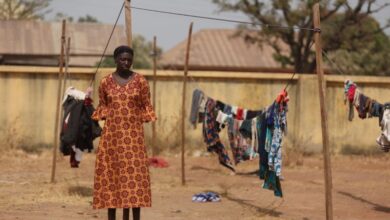War, economic struggles threaten Bethlehem’s century-old crafts tradition
 Bassem Giacaman in his shop in Bethlehem in December 2024. The artisans in Bethlehem are almost all Christians. They primarily work with olive wood. Most of the businesses in Bethlehem are family businesses. / Credit: Marinella Bandini
Bassem Giacaman in his shop in Bethlehem in December 2024. The artisans in Bethlehem are almost all Christians. They primarily work with olive wood. Most of the businesses in Bethlehem are family businesses. / Credit: Marinella Bandini Bethlehem, West Bank, Dec 21, 2024 / 13:00 pm (CNA).
Being an artisan in Bethlehem isn’t just a job. It’s an art, almost a calling, a treasure handed down from father to son, but one that is now at risk of being lost.
Younger generations are choosing other career paths, and after two years of war, fathers don’t see a future in the artisanal crafts for their children. They speak of it under their breath, as if unwilling to admit it. Some know they’re likely the last heirs of a centuries-old tradition.

“I am 54 years old. My biggest mistake was to invest all my money in my family business,” Jack Giacaman, a descendant of one of the most important artisan families in Bethlehem, told CNA. His shop faces Milk Grotto Street, the artisans’ street, just a few steps from the sanctuary of the same name. “I have two daughters. I tried to make them see the world from other perspectives, not to kill their future in this corner of the world.”
“They are not thinking about working in our family business,” Giacaman continued. “And so also my cousin’s children: They moved to the medical field, they’re engineers, but they are not thinking about working in this business or staying in this country.”
Most of the businesses in Bethlehem are family businesses, and all of them are operating at a loss.
“Families try to cover the losses from their private assets, but it is no longer affordable,” Giacaman explained. “At the end, people are running away, they go abroad, and unfortunately among them there are many Christians.”

One of Giacaman’s brothers moved to the U.S., another went to Dubai. “I grew up in a Catholic school, we were 55 students — six were Muslims, 39 Christians, among which were eight girls. Who stayed in the country? The Muslim guys, two girls, and me. All the others moved abroad; their children don’t have any kind of connection with Bethlehem anymore.”
The only one who has gone the opposite route is his cousin Bassem Giacaman, who came a few years ago from New Zealand to manage the family business, which is next to Giacaman’s.
In Bassem’s workshop, cobwebs cover two large statues, the wood is eaten by worms, and in the shop, the lights shine on products no one comes to buy. Despite everything, he said he wouldn’t go back.
“I came back to take care of the family business,” he explained. “I don’t want to sell the workshop because here is our history — my father’s, my grandfather’s, and others before me. Here is our history as Christians of Bethlehem.”
“We take it day by day,” he continued. “We try to sell online, and in this way, we get by, but shipping costs keep going up. I’m not looking for donations; I just want to work and provide jobs for my workers.”

The artisans in Bethlehem are almost all Christians. They primarily work with olive wood. The logs stacked in their storage spaces, shaped by their hands and in their workshops, are transformed into crosses, Nativity scenes, Nativity figures, and Christmas decorations.
Today, many of those items are covered in dust on store shelves, workshop machinery sits idle most of the time, the workforce has been halved, and the remaining workers usually only work two or three days a week — there simply isn’t enough work for everyone.
Those who can, try to sell online, surviving thanks to some orders from abroad, but rising taxes, tariffs, and increasingly restrictive laws make everything more complicated.
Next to the Basilica of the Nativity, Roni Tabash continues to run the family business, one of the best-known in the city. Next year it will be 100 years since the store has been selling handmade items crafted by local artisans. “We provide employment for 25 families, over a hundred people,” he told CNA.

At the threshold of the shop’s entrance, Tabash looks at the empty streets around the Church of the Nativity. “Last year, we hoped that after Christmas the war would be over, but it’s still not finished. It’s getting worse; pilgrims no longer come to Bethlehem. People are struggling and not buying. For us artisans, the situation is really difficult,” he shared.
His father, Victor, who is 80 years old, was also in the shop, having just returned home a few days ago after a long hospital stay. “As soon as it was possible, he came to the shop; it’s his life,” Tabash said. “This will be his 61st Christmas at the shop. I sometimes say that we don’t need to stay open every day, but he says we must open, for hope.”
Tabash will celebrate Christmas with his family. “As Christians, we want to celebrate Christmas because, for us, Christmas is a light in the night. This is our faith, which is stronger than anything. But we hope for peace, because our future and that of our children is at risk.”

Under the arcade of Manger Square, the shutters of the souvenir shops are all down.
“I can still work in my workshop,” Robert Giacaman, a relative of Bassem and Jack, told CNA. “We get some requests, but not like before. We try to give work to our employees. Many can no longer support their families or their children’s education… an entire generation is being lost.”

Robert took CNA through his workshop to explain how a Nativity scene is created. “We buy the wood from the Ramallah area because the olive trees there are larger. After selecting the wood, we rough out the trunk with a saw and cut pieces to the size needed for the figure. We use a pantograph for the coarser work and routers for the details. Then there’s the sanding and polishing phase.”
An all-around artist — he is also a painter and sculptor — Robert brings artistic ideas into his craftsmanship. “I always give my workers instructions: how to work, pay attention to the grain of the wood, and how to finish the pieces. I try to make them sensitive to this artistic side.”
He is also active in Christian associations, particularly with the Catholic Scouts of the Holy Land. This is why he experiences the preparation for Christmas with special intensity.
“We want to show Christians around the world that we live Christmas in any situation we find ourselves in,” he said. “These past two years have been quite sad, but in our hearts, there is the joy of Christmas. We want to send a message of peace to the world, because peace must start from the city where Christ was born. I hope that this year, Christmas brings peace to the whole world.”




